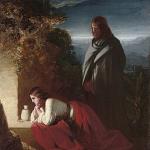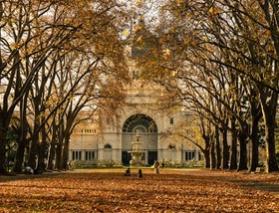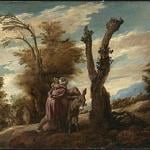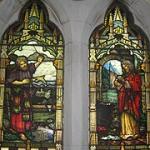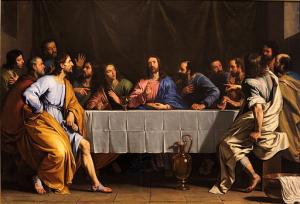
“We may think that coming unto Christ requires a strength, power, and perfection we don’t have . . . [but] faith in Jesus Christ is what gives us the energy to begin.”1 These reassuring words of Elder Claudio R.M. Costa introduce a metaphor I love: Christ offers us an “extra layer of strength.” Aproaching Easter, I remember the extra layer of strength Christ gave His apostles as He prepared to leave them.
Peter was especially vulnerable, as he was to lead Christ’s Church. The Savior knew this; so did Satan.
A Week of Foundations
Foundations included layers of strength, energy, and ability to learn and apply teachings fully and quickly.
As Christ triumphantly entered Jerusalem, Peter may have thrown palm branches into the street—or worked desperately to keep the donkey from tripping over them. But the temple was filled with contention; those inside wanted no hosannas and no children singing. But the truth of these shouts and songs could not be silenced. Christ’s apostles experienced the strength of worship and the intensity of hatred. He could cast out money changers, but others would still pollute the temple.
Christ warned in parables: the 10 virgins, with the danger of inadequate preparation, and the parable of the soils, with difficulties of human differences.
The Upper Room
Despite sobering impressions, Peter entered the upper room with his exuberant enthusiasm. The four Gospels portray different happenings. This account brings them together to explore a developing layer of strength for what Peter was destined to do and become (Matthew 26, Mark 14, Luke 22, John 13-18). Christ know Peter’s strengths, weaknesses, and destiny—and so did Satan.
As the meal began, Jesus acknowledged their last meal together, adding that one of these apostles would betray Him. They were “sorrowful”; some asked, “Is it I?” Judas left; they would soon know why.
During the meal Jesus gave them bread and drink, not surprising; but what He told them might have been startling. Breaking and blessing the bread with thanks, He said, “This is my body which is given for you: this do in remembrance of me.” Later, passing the blessed cup, He completed the ordinance: “This is my blood of the new testament which is shed for many for the remission of sins.”
After the meal, another ordinance. Christ settled their arguments over ranking in His kingdom by walking among them washing and drying their feet. Peter was indignant:
“Lord, dost thou wash my feet?”
“What I do thou knowest not now; but thou shalt know hereafter.
“Thou shalt never wash my feet.”
“If I wash thee not, thou hast no part with me.
Mere washing? Impetuous Peter responded, “Lord, not my feet only, but also my hands and my head.” Jesus assured him that feet were sufficient. The significance? “If I then, your Lord and Master have washed your feet; ye also ought to wash one another’s feet.”
The comforting promise of “the comforter” followed; also these precious words:
A new commandment I give unto you, That ye love one another; as I have loved you, that ye also love one another. By this shall all men know that ye are my disciples, if ye have love one to another.
But warnings darkened the comfort: preaching would require purse, scrip and sword. Peter was confident—they had two swords among them.
Jesus warned Peter specifically: “Simon, Simon, behold, Satan hath desired to have you, that he may sift you as wheat: but I have prayed for thee, that thy faith fail not.” The reason must have been terrifying: “The prince of darkness, who is of this world, cometh, but hath no power over me, but he hath power over you.“
Divinity and Infamy
Walking toward Gethsemane, Jesus warned the 11, “All ye shall be offended because of me this night.” Idealistic and willing, Peter replied, “Though all men shall be offended . . . yet will I never be offended.” Peter rejected warning of his denial: “Though I should die with thee, yet will I not deny thee.” The others echoed him.
Peter, James, and John were to remain close as Christ suffered: He began His atonement alone. He returned to find them sleeping—”for sorrow” (Luke 21:45). The Savior was concerned for Peter: “Simon, sleepest thou? . . . Watch ye and pray, lest ye enter into temptation.” He understood Peter: “The spirit truly is ready, but the flesh is weak.”
At the third return, violence was approaching: with swords, staves, and Judas. As they seized Jesus, Peter—sword ready—cut off the right ear of Malchus. Despite His own danger, Christ quickly healed the ear. David A. Bednar testified, “[He] reached out and blessed His potential captor using the same heavenly power that could have prevented Him from being captured and crucified.”2
“What about Peter?” asked Susan H. Porter.
The dark forces that were gathering around the Savior must have been very frightening for the Apostles. Peter acted rashly; however, the Lord healed the wound that Peter caused. We don’t know whether the healing of Malchus saved Peter from consequences that would have kept him from fulfilling his mission. But what a gift to Peter!3
Finding their own flesh weak, the apostles fled. But Peter followed to the high priest’s home and sat with the “officers” and servants (including Malchus’ kinsman)—a uniquely unsafe environment. When three servants recalled seeing him with Jesus, Peter denied Him, and afterward wept bitterly.
Compassionate and understanding, Jesus, after His resurrection, asked Peter three times to declare his love. Three times Peter had thoughtlessly denied; three times he expressed fervent love. His layer of strength could endure challenges ahead.
We all know Peter became a powerful spiritual giant as he led Christ’s Church during critical times and eventually into his martyrdom, with infinite layer upon layer of strength, courage, dedication, and genius bestowed by the Savior through the Holy Ghost.


